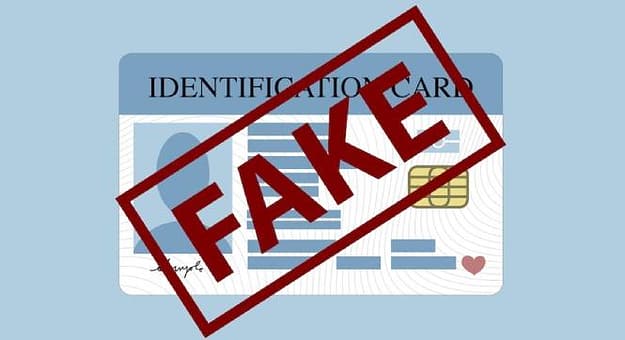It is unlawful to manufacture, sell, offer to sale, furnish, offer to furnish, transport, offer to transport, import, offer to import; a deceptive identification document into the state, unless the document has printed conspicuously on the document; in permanent ink the name of the manufacture and diagonally across it the term: NOT A GOVERNMENT DOCUMENT.
What is the term deceptive identification document, as defined under Business and Professions Code 22430(a) BPC?
A deceptive identification document is any document issued by a State or Federal government, that infers to a reasonable person to believe that the document itself was issued by a State or Federal government, it purports to represent. The document is not limited to the categories of driver’s licenses, identification cards, birth certificates, passports, or social security cards.
What is the mental state required for a violation under BPC 22430(a)?
The mental state required for a violation of Business and Professions Code 22430(a) BPC, is knowingly. Knowing, is being consciously aware of the nature of the act desired to be completed, and reasonably understanding with an objective point of view the natural and probable consequences that would result from the act being completed. As applied to Business and Professions Code 22430(a) BPC, the State must prove beyond a reasonable doubt that the accused was consciously aware; they had within their control a deceptive identification document, and with that knowledge desired to: manufacture, sell, offer to sale, furnish, offer to furnish, transport, offer to transport, import, offer to import the identification document into the state.
BPC 22430(a) – Sentencing
A violation of Business and Professions Code 22430(a) BPC is charged as either a misdemeanor or felony. As a misdemeanor the punishment includes confinement not exceeding 1 year in jail; and fines not to exceed $1000 dollars. As a felony the punishment includes confinement terms of 16 months, 2 or 3 years in prison, with fines not exceeding $10,000 dollars.
What is an example of a violation of BPC 22430(a)?
- Vincent and his Sister Susan created a 20-person group summer trip to the 2022 Miami EDM Winter Festival. They lived in Los Angeles and wanted to travel to Miami for the event. And they needed to book rooms. It was a package deal. Their only problem was that none of them were above the age of 18 years of age, so booking a room for this event was a problem. And none of their parents were going to help. Susan asked everyone in the group to purchase a “Fake California Driver’s License,” so that they can book group rooms, and purchase alcohol. Everyone responded affirmatively. She explained that her brother Vincent, was a computer whiz and could design and create the driver’s licenses. Everyone was happy to prepay for their identification card. Vincent created 20 counterfeit driver’s licenses, using a DMV driver’s license template purchased online through his Web 3 platform. The DMV templates were real, but he used an edited program to distinguish his product by changing the arrangement of the personal data on each driver’s license, to prevent them from being authentic. Several friends of the members in the group heard what was going on and asked to pay for their driver’s license. Vincent refused. Three days later, Vincent’s house was subjected to a raid by police who initiated a “no knock search warrant.” Once inside, all 20 unfinished drivers’ licenses were discovered, as well as multiple DMV driver license templates, a scanner, and computer whose screen displayed an editing application of DMV driver’s license template. Vincent was arrested. After an investigation, the friends, in exchange for leniency of no charges implicated Susan. Susan was arrested.
BPC 22430(a) – Defenses
- Withdrawal- renunciation of offer – Once the accused took sufficient steps to understand the reality of the unlawful conduct and exposure to risk the accused notified all parties that were involved in the violation and separated himself from further involvement by notifying third parties and notifying the police to sustain no criminal liability.
- Diminished Actuality / Mental Disorder – a) The accused at the time of the offer suffered from a cognitive defect that is recognized as a category under the DSM that prevented the accused’s appreciation of the consequences of his actions. b) The accused at the time of the offer suffered for a condition that although is not a mental disorder, disabled his facilities of perception of right and wrong to not qualify any mental state sufficient to appreciate ownership of a criminal act.
Deceptive Identification Documents – Hire Us
If you are charged with a violation of Business and Professions Code 22340(a) BPC, call Law Mart today.


